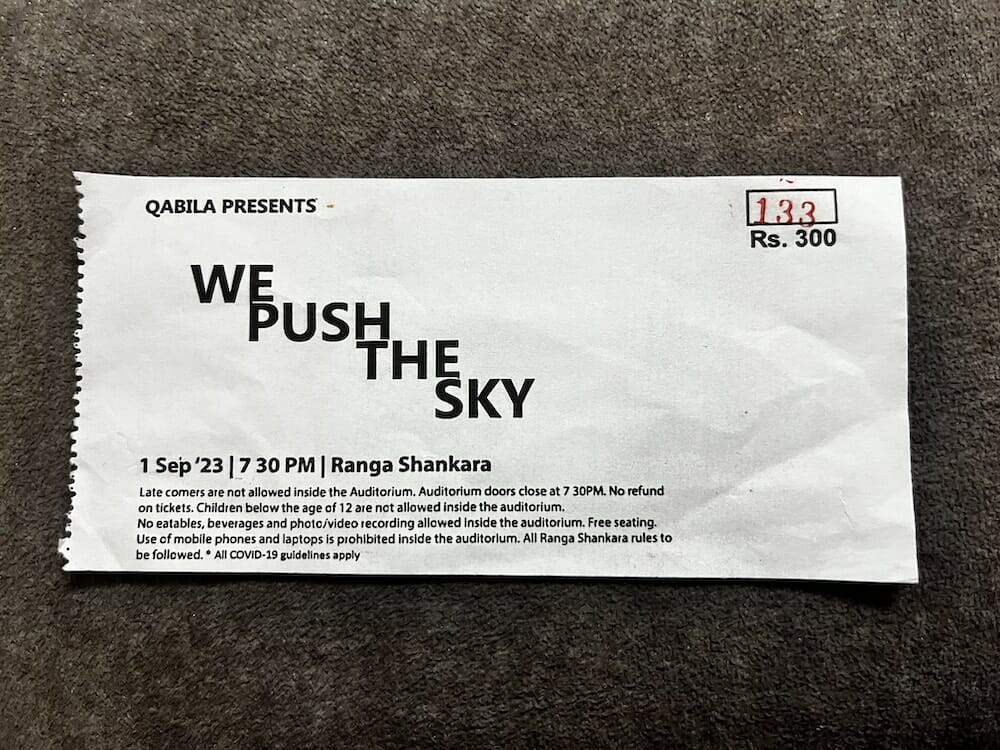She made us laugh. She made us cry. She made us get angry. She made all of us at Ranga Shankara rise as one at the end, speechless after what we had just witnessed. After the standing ovation, I looked around only to find the person next to me looking back at me with bloodshot eyes.
The half a dozen early teenagers I had gone with were gushing, thoroughly in awe. For, we all sat on the stage, getting a ringside view of the powerhouse performance. We had just finished watching We Push the Sky, presented by Qabila Collective.
The play had debuted as an audio play during the pandemic. Nisha Abdulla is not only the writer and the storyteller of the play but also the sole performer, receiving excellent backstage support from her team at Qabila. Ujwala Rao is the director of the play.
For most of the teenagers, this was their first time at Ranga Shankara. After performing a play of their own for a school fund-raiser, they were keen to see a “real” one. They came away saying this was better than anything they had expected and soon made a beeline to talk to Nisha and get her autograph.

Read more: “Bigotry feeds on our anti-Muslim bias”
A story of our times
Was this story autobiographical? I do not know. It might well have been. It was also a story of our times. Several parts of which some of us might be intimately familiar with. Or not. The story of the steady demonisation of a community accused of bringing religion into everything, of WhatsApp wars fueled by misinformation and incidents of lynchings, and cases of love jihad and jihads of anything imaginable.
These incidents have penetrated our veil of silence, and yet we have forgotten them. Like that of Najeeb Ahmad, the story of whose disappearance from JNU in 2016 has all but disappeared from our collective memory. The story of 16-year-old Junaid, who was lynched over his skull cap in a train in 2017. And of imminent police action on peaceful anti-CAA protestors.
Read more: “Even in Bengaluru, even today, you could find it hard to rent a flat if you have a Muslim name”
A play about friendship
But it wasn’t about mere news items. It was a story of childhood friendships, gained and lost, from the perspective of a Mapilla Muslim, who are often said to be the oldest native settled Islamic community in South Asia.
The performance was part history lesson, part culinary exploration, and part feminist fable. The fourth wall was constantly broken, with the protagonist engaging with the audience. We grow up with the protagonist and laugh at the eccentricities of the cultures we straddle.
We remember our friendships. We acknowledge that people are more than their faith. We shudder when confronted with tales of mortal danger. We realise the perils that purported guardians of faith pose not just to marginalised members of other faiths, but even to their own.
Under the protagonist’s piercing gaze and strident voice, we confront our complicity. In the normalisation of hate over the last decade, in the repeated silences over the othering of an entire community, we realise the personal is often intensely political.
Can a solo performer on stage accomplish all this? Nisha does. She made sure we listened. She made sure we went back with a renewed appreciation for the power of theatre and a renewed appreciation for hope, resilience and a head not bowed in shame.
Bengaluru, renowned for its easygoing and welcoming nature, is experiencing a rise in hate-related incidents. Whether it is derogatory remarks against “puncturewallahs”, the violence in DJ Halli, the communal hate incited during COVID-19 outbreaks in Padarayanapura or even the communal spin to a BBMP Covid war room bed scam, hate and misinformation are hurting Bengaluru. Citizens can no longer ignore these issues.
It is now our turn to speak up. Or at the very least, engage.
A parent’s take
When I asked my 13-year-old daughter if she enjoyed the play, she replied: “Totally”. When I asked her if she followed the play, she said “Some parts of it.” We then began a conversation to fill up the gaps. Nevertheless, the resounding verdict was that she would definitely want to see more such plays. The kids I went with were probably the only kids in the audience, despite the play being rated 12 and above. More teenagers need to see this play.